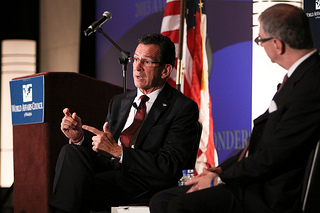[soundcloud id=’198831266′]
By Charlie Smart
The voicemail of Indiana Gov. Mike Pence’s press secretary has been full following the governor’s signing of the Religious Freedom Restoration Act, a bill aimed at limiting the government’s ability to obstruct the free practice of religion in the state. The act was met with immediate criticism by opponents who fear that it pave the way for certain forms of discrimination.
Religious freedom restoration acts are nothing new. So far 19 states including Connecticut as well as the federal government have similar laws in place. What sets Indiana’s law apart is the fact that it specifically outlines the rights of for-profit businesses to freely practice religion. Critics of the bill say that this could allow for discrimination against employees and customers based on sexual orientation on the grounds of religious beliefs.
This is a concern of Fleurette King, director of the Rainbow Center, UConn’s LGBTQ cultural hub. She thinks that the law “could be blatantly discriminatory towards folks who are lesbian, gay, bisexual, transgender and so forth.”
Megan Brannan, graduate assistant at the Rainbow Center, fears that this act could make it harder for gay men and women in Indiana to embrace their sexual identity. She thinks that people may keep their sexuality a secret for fear of discrimination and poor treatment.
Connecticut Gov. Dannel P. Malloy took a firm stance against this act on Monday when he signed an executive order banning state sponsored travel to Indiana for as long as the act stays in place. Though it does not mention Indiana specifically, Malloy’s order clearly alludes to the state’s recent act, and according to University of Connecticut President Susan Herbst, the UConn men’s basketball team will not be traveling to Indianapolis for the NCAA Final Four events.
King agrees with the university’s decision not to attend the Final Four. She is happy that UConn is using its recognition in the college sports world to stand behind this issue.
Greg Baliko, a member of the UConn Division I men’s swim team agrees. He said that while he understands that this band could inconvenience some, he “likes the way it’s making a statement for what we [the university] wants to stand behind”.
King says that she hopes to see Indiana law modified to include sexual orientation as a legally protected class as it is in many other states including Connecticut. She likened the the potential for discrimination against LGBTQ individuals in Indiana to the Civil Rights era.
Many people from UConn students to Gov. Malloy to NCAA President Mark Emmert have come out against Indiana’s bill in recent days. Indiana Governor Mike Pence has since said that he “abhors discrimination,” but does not appear to be backing down from the bill.



I for one feel that business people dont have to affiliate with certain type of people or do business by their religion Rights or morals , they should have that right to refuse Business regardless without being called discriminating ! it would be like if someone tell you how to run your household and if you don’t like it your discriminating , how ridiculous does that sound ! you shouldn’t have to be forced by law to affiliated or do business with certain individuals that contradicts your value’s and morals or religion Rights . this would not be a discrimination ! are anything like that ! its all about there own personal morals and religion Rights ! without a certain individual hollering discrimination.they should show the same gratitude and the same rights and values. This is there business . they should run it the way they see fits .
If they don’t like it , LEAVE !!!